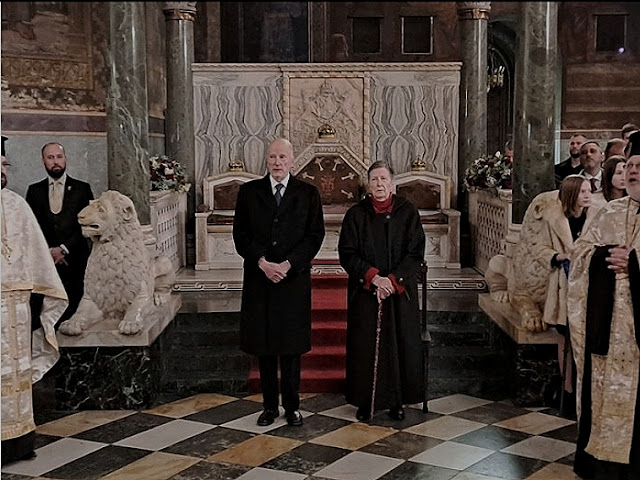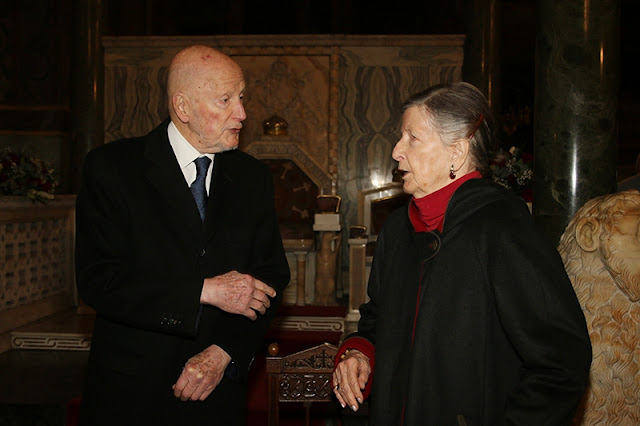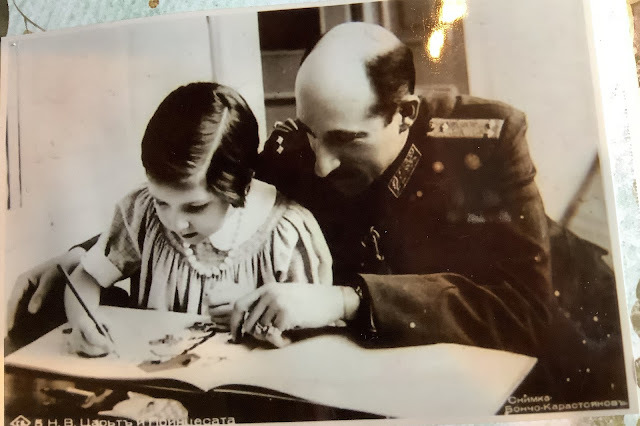When Queen Giovanna of Bulgaria gave birth to her first child, Marie Louise, on January 13, 1933, it was assumed that the infant, who was named for her paternal grandmother, Princess Marie Louise of Bourbon-Parma, would be baptized in the Roman Catholic church. This was the agreement that was made in 1930 when then Princess Giovanna of Italy, the third daughter of King Vittorio Emanuele of Italy, and Princess Elena of Montenegro.
Pope Pius XI gave his approval for the Roman Catholic Princess Giovanna to marry King Boris III in a Catholic Ceremony after Boris agreed to raise their children Catholic. The Pope was none too happy when Giovanna and Boris had a second wedding in the Orthodox church after her arrival in Bulgaria.
There was an outcry when Marie Louise was baptized into the Orthodox church although she did not have succession rights to the throne. The baptism took place the day after her birth. Queen Giovanna did not attend the ceremony as she was recovering from the birth. She was not told about the baptism until after it took place.
According to the New York Times, Marie Louise was baptized at 10:00 a.m. King Boris did not even wait for the arrival of his mother-in-law, Queen Elena of Italy, who arrived that evening when she learned that her granddaughter was already an "Orthodox Princess." A Princess of Montenegro by birth, Elena was raised in the Orthodox faith but converted to Roman Catholicism shortly before her marriage to King Vittorio Emanuele III in 1896
"I have no ill feeling against Bulgaria. Orthodox baptism is a religious question. There will be no sanctions or ex-communication against Giovanna, who is quite innocent in the whole affair. King Boris ruled and she obeyed. The king will explain to the Vatican on his next visit to Rome."
Marie Louise's younger brother, King Simeon, was also baptized in the Orthodox church following his birth in 1937.
There was a precedent for this. Marie Louise's grandfather, Prince Ferdinand of Saxe-Coburg and Gotha was elected Prince of Bulgaria in July 1887. In April 1893, he married Princess Marie Louise of Bourbon-Parma, in what many describe as a marriage of convenience. As a Sovereign Prince, Ferdinand needed an heir. In January 1894, the new Princess of Bulgaria gave birth to a son, who was named Boris. The infant Prince was baptized in the Roman Catholic Church, the faith of both his parents. There was a lot of pressure placed on Ferdinand by the Bulgarian government, the Orthodox church, and the Bulgarian people, all of whom wanted the Crown Prince to be raised in the Orthodox family.
In February 1896, the two-year-old heir apparent was received into the Orthodox church. Contrary to what many have reported, Boris did not undergo a second baptism as the Orthodox Church recognized the Roman Catholic baptismal service. He was confirmed in the Orthodox church. Confirmation usually takes place during baptismal service. Nicholas II was asked to be Boris's godfather, but he declined.
Boris' conversion led to family discourse, especially with the Princess's family and Emperor Franz Josef of Austria.
For his decision, the Roman Catholic Church excommunicated Ferdinand. He and his first wife would have three more children, Kyril, Eudoxia, and Nadezhda, all of whom were raised Roman Catholics. Princess Marie Louise, worn out after giving birth to four children in five years and suffering from pneumonia, died 24 hours after giving birth to her youngest child.
Life would be different for the Princess of Bulgaria's granddaughter, Marie Louise, who was raised with her younger brother in a loving home with parents who were devoted to their family and to Bulgaria. Boris succeeded as king following his father's abdication in 1918. The rise of National Socialism in Germany and its determination to reshape Europe proved difficult for Boris as he tried to remain neutral during the second world war. He resisted pressure from Germany to join them in the war against the Soviet Union, but Bulgaria did declare war on Great Britain and the US in December 1941.
After returning to Sofia from a visit to Hitler in August 1943, Boris suffered a heart attack and died on August 28, He was 49 years old. There were rumors that Hitler poisoned the King because he had told the German dictator that he would not send Bulgarian troops to the Eastern Front. He also stood up to Hitler by refusing to allow Bulgarian Jews to be arrested and sent to concentration camps.
In a 2019 interview with a Bulgarian newspaper, Princess Marie Louise acknowledged the number of theories and fabrications regarding her father's death. But she does not believe that either the Germans or the British were involved in his death. "The British had no point in killing him because my father was trying to make a turn to the West." She is convinced that the East had killed her father, which had everything to gain from Boris' death.
Simeon was only six years old when he succeeded to the throne. The regency for the young king included King Boris' younger brother, Prince Kyril.
In September 1944, Soviet troops marched into Bulgaria and occupied the country, thus ending the country's neutral government.
Bulgaria joined the Allies, and within weeks, a coup d'état led to the installation of a pro-Soviet government. It was only a matter of time before the Communists would take control of the tiny Balkan nation.
Pro-Soviet officials replaced the regency. Along with the entire Bulgarian government, journalists, military officials, and politicians, Prince Kyril, and the other regents were arrested and executed in February 1945. More than 100 people were executed and thrown into a mass grave.
Queen Giovanna and her two children remained at Varna Palace until September 15, 1946, when a Soviet-controlled referendum led to the end of the monarchy. The following day the royal family went into exile, first to Alexandria Egypt, joining King Vittorio Emanuele and Queen Elena of Italy (Giovanna's parents) already in exile.
In Alexandria, Princess Marie Louise was a pupil at the Sacred Heart School, a private Roman Catholic school.
In 1951, Francisco Franco granted Queen Giovanna and her two children asylum in Spain.
Princess Marie Louise studied nursing at the Spanish Red Cross's nursing school. She has been married twice, first in 1957 to Prince Karl of Leiningen. This marriage ended in divorce. In 1969, she married Polish-born Bronislaw Chrobok, a financier. They lived in Canada for several years before moving to New Jersey. She has two sons, Prince Boris and Prince Hermann of Leiningen from her first marriage and a son and a daughter, Prince Pawel and Princess Alexandra de Kohary, and eleven grandchildren, and two great-grandsons.
In 2010 King Simeon II inherited the Kohary title, from his second cousin once removed Prince Johannes Heinrich of Saxe-Coburg and Gotha-Kohary. Two years later, he established absolute primogeniture for the Kohary inheritance and ceded the title to his older sister, Marie Louise as the Princess of Kohary, and her two children by her second marriage and their descendants.
The actual Kohary estates no longer belong to the family.
Princess Marie Louise was the first member of the Royal Family to return to Bulgaria. Her first visit was in May 1991, when she made a private visit to the country. It was announced that the princess would pay respects at her father's grave, visit several cities and meet with members of the public at a concert hall in Sofia.
More than 1000 monarchists were waiting at the airport when Princess Marie Louise stepped out of the Balkan Airlines flight from Madrid.
"I am so moved that I can hardly speak. I never expected this," the Princess told reporters. "I am very happy and very touched by the reception, "her arms overflowing with flowers." "After 45 years, I came just to see my motherland."
It was noted that the Princess spoke "flawless Bulgarian."
More than 15,000 Bulgarians cheered the princess when she attended a soccer game on May 9, 1991. When she arrived in Sofia's town center, a "crowd of about 50,000 were ready to welcome her, chanting "We want Simon, we want our king!"
After spending a week in Bulgaria, Princess Marie Louise returned to Spain where she and King Simeon held a news conference attended by Spanish and international journalists.
"I have had no meetings - neither official nor secret with members of the Bulgarian government. Mine was a private visit to Bulgaria," the Princess said. I met with people from all circles. I was impressed by the broad-mindedness and the freedom of views I found there. Maybe certain circles were upset, but I had no problems, no obstacles. On the contrary. I will remember that trip for a feeling of tolerance, for a conviction of democracy in Bulgaria, is become a fact.
"My trip was not just a nostalgic pilgrimage. We want to help, to prove we can all work together for Bulgaria's overcoming her difficulties."
Two years later, Queen Giovanna, accompanied by her daughter, returned to Bulgaria, where both "received a warm welcome." King Simeon's first visit to Bulgaria in more than 50 years took place in May 1996.
For three decades now, Princess Marie Louise spends a part of each year in Bulgaria. Her most recent visit was in January when she celebrated her 90th birthday. Her eldest son, Prince Boris, picked her up at her home and drove to the airport for the flight to Sofia. They were joined in Bulgaria by her three other children, Prince Herman, Princess Alexandra, and Prince Pawel, who flew from Canada, Portugal, and San Francisco respectively.
Several of the Princess' grandchildren were also present for celebrations.
A Te Deum service was held at Alexander Nevsky Cathedral in Sofia in honor of Princess Marie Louise, who was accompanied by King Simeon and her children and grandchildren. They were joined by Simeon's only daughter, Princess Kalina, her husband Kitin-Muñoz, and their son Simeon-Hasan.
Queen Margarita was unable to attend the festivities as she had to remain in Madrid, where she is recovering from hip surgery.
King Simeon issued a statement extending congratulations to everyone born on January 13:
“On the day my beloved sister turns 90, I want to send my best wishes and congratulations to everyone celebrating their birthday today! However, especially those who are also celebrating their 90th anniversary! For many years to come!"
Princess Marie-Louise spoke to several reporters: "Every year I come to Bulgaria, unfortunately, due to COVID-19 I couldn’t come recently, but it is a great joy for this holiday and for my 90th birthday, which is no longer a joke”.
Her previous visit to Bulgaria was in 2019 when she attended the commencement ceremonies at the American University. The Princess has been a member of the university's board of trustees for the past 24 years.
 |
| all the images are from the collection of HRH Princess Marie Louise of Bulgaria and are used with her permission |
She told me: "My greatest wish was to celebrate my 90th birthday in my own home, my own country with my children."
The princess said she was incredibly sad that her husband, who is in poor health was unable to accompany her, but said he was thrilled that she was able to spend her birthday in Bulgaria.
After spending several days in her beloved homeland, the Princess returned home to the United States. She plans to return to Bulgaria in May for the American University's commencement ceremony.







.jpg)



1 comment:
Congratulation
Post a Comment